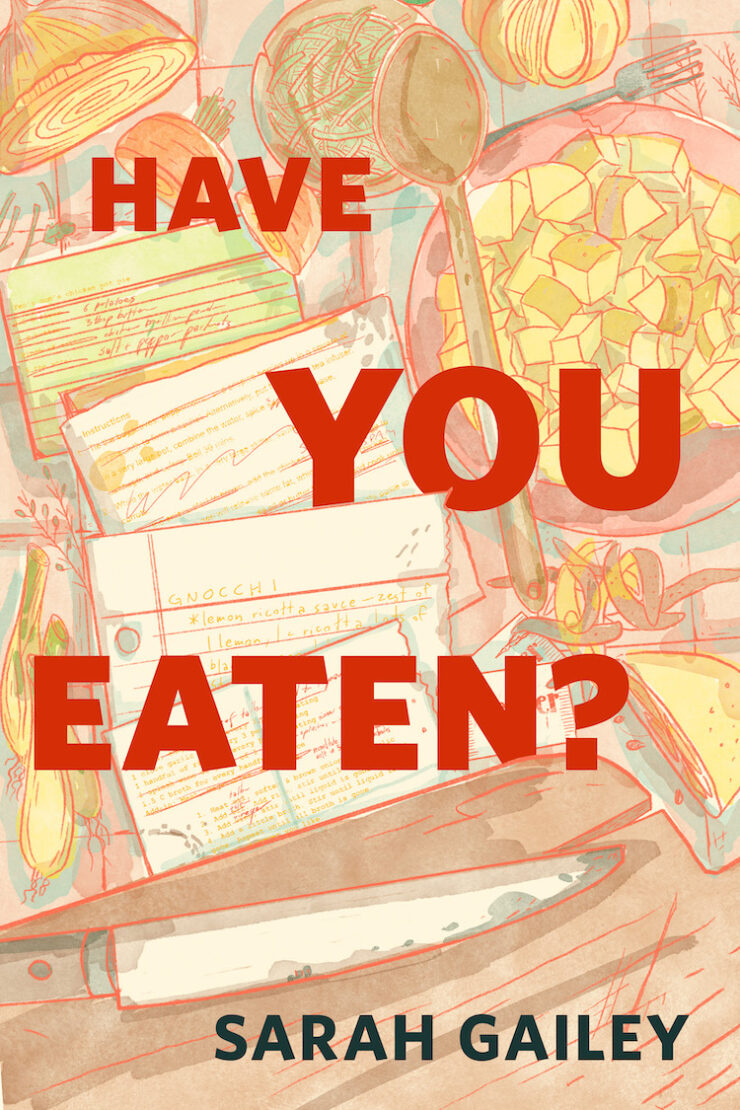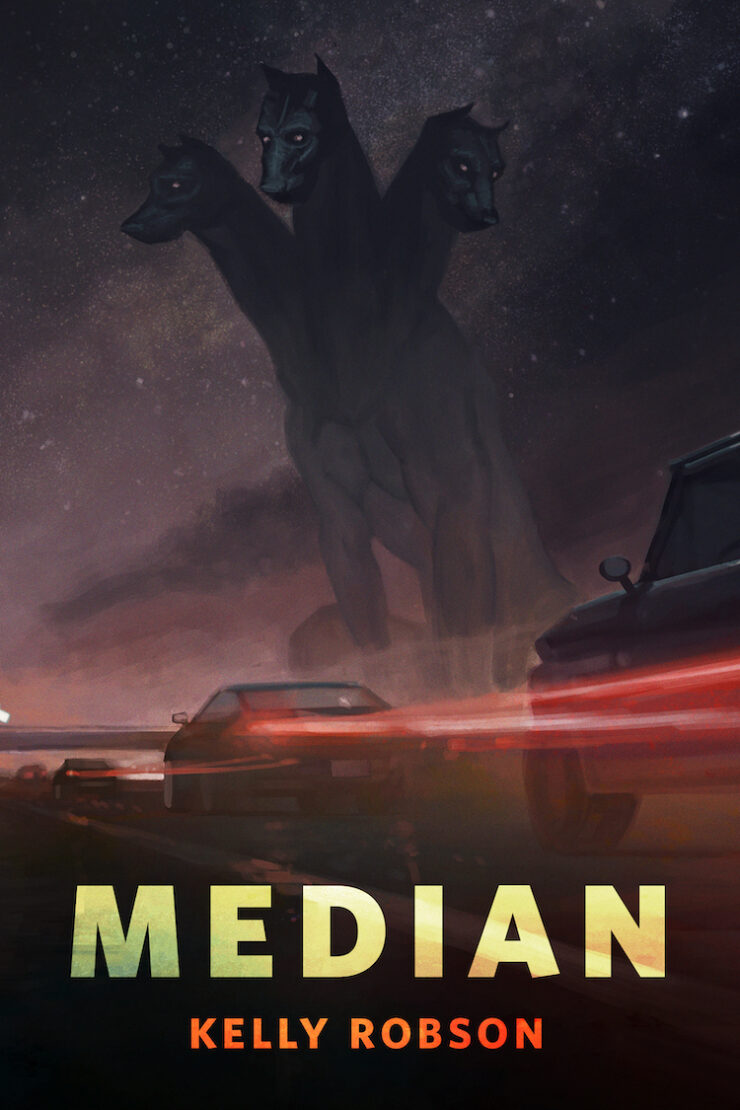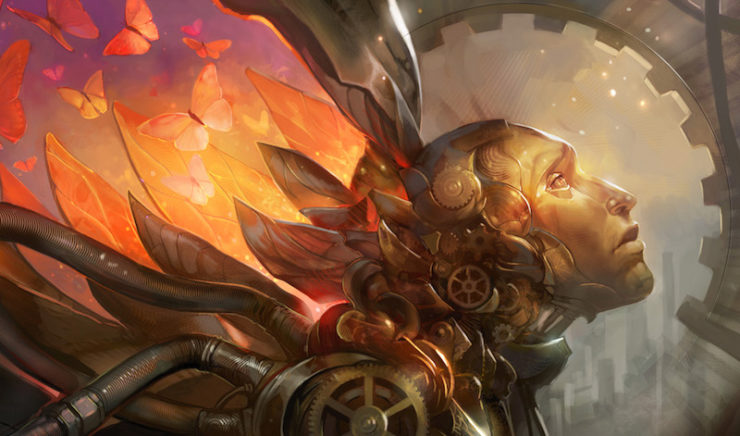A few years ago, Jo Walton (inspired by a conversation with Patrick and Teresa Nielsen Hayden) took on the sort of challenge that we love doing at Tor.com: She counted up the number of science fiction and fantasy book titles pulled from two classic poems, William Blake’s “The Tyger” and Andrew Marvell’s “To His Coy Mistress,” to see which had inspired more titles.
You can read Walton’s tally here; in this post, we’re doing a deep dive into some of the titles from each to see the different ways in which authors have interpreted the oft-quoted words of these poets. We also spotted a few other SFF titles in other famous poetry, including a holy sonnet taken quite literally for a disturbing SF sequence…
Read on and share your own cross-genre finds!
“The Tyger” by William Blake
Tyger Tyger, burning bright,
In the forests of the night;
What immortal hand or eye,
Could frame thy fearful symmetry?
Tiger! Tiger! by Alfred Bester
The UK edition of Bester’s The Stars My Destination draws inspiration from the central figure in Blake’s poem to describe its protagonist: Unassuming Gully Foyle, marooned in space and then abandoned by a passing ship, goes full Count of Monte Cristo in his need for revenge, and picks up quite the tiger face tattoo. Happening upon a fortune of platinum helps transform him into the nouveau riche “Geoffrey Fourmyle”—the wealthy, educated, physically fit persona he will use to take down the economic superpower Presteign family, who sent out the order not to rescue him. Even as Foyle gets the tattoo removed, he remains tiger-like, stalking his prey in his plan for vengeance.
Burning Bright by Melissa Scott
Scott’s standalone space opera christens the planet on which it is set not with tigers or forests, but the incredibly descriptive “burning bright”: nestled into the sweet spot of an interstellar trade route frequented by both humans and the alien hsai empire, Burning Bright enjoys a healthy tourism influx not just for the trade but for its other main attraction, the Game. This shared virtual-reality RPG invites players—such as pilot Quinn Loie, on shore leave while her ship is repaired—to shape the borders of the virtual world and create new scenarios for fellow players. But even as her new scenario attracts unusual attention, Quinn finds herself threatened in the real world, stuck between the two warring empires.
“In the Forests of the Night” by Jay Lake
The first novella in John Scalzi’s collection METAtropolis also sets up the worldbuilding for the other four stories: in a futuristic “uncivilization,” cities are crumbling and reforming as their former citizens wage war, the technological haves versus the eco-survivalists have-nots. In Lake’s tale, Tygre (short for Tygre Tygre) enters the city of Cascadiopolis, located in the foothills of the Cascades near what used to be Portland, OR. Interestingly, Tygre’s name and arc have drawn comparisons not just to the Blake poem, but to Bester’s Tiger! Tiger! as well.
Her Fearful Symmetry by Audrey Niffenegger
One of the most inventive allusions comes from The Time Traveler’s Wife author’s second novel, in which twenty-year-old twins Julia and Valentina inherit a flat from their deceased aunt, who was herself the twin sister of their mother… and who may live on as a spirit. As “mirror twins”—that is, identical twins with mirrored internal organs, Valentine’s heart residing on her right side—they embody the fearful symmetry of Blake’s poem. Critics have also pointed out that the flat bordering on Highgate Cemetery could make for a fun little pun.
“To His Coy Mistress” by Andrew Marvell
Had we but world enough and time,
This coyness, lady, were no crime.
We would sit down, and think which way
To walk, and pass our long love’s day.
“Vaster Than Empires, and More Slow” by Ursula K. Le Guin
In this famous short story (collected in The Wind’s Twelve Quarters), Le Guin is in conversation with Marvell almost as much as the human survey team is with the planet to which they are sent—a strange world completely covered in vegetation, with no sign of animal life but thrumming with sentience through every blade of grass: the title is taken from a line describing how “Our vegetable love should grow/Vaster than empires, and more slow.” The story’s conclusion also makes a reference to another Marvell poem, “The Garden,” translating the phrase “a green thought in a green shade” rather literally when discussing the plant life’s consciousness and describing this alien world as “one big green thought.”
A Fine and Private Place by Peter S. Beagle
“The grave’s a fine and private place,” Marvell’s poem reads, “But none, I think, do there embrace.” Beagle challenges that notion with his wistful fantasy about a homeless, bankrupt pharmacist who has left society behind to live in a graveyard; there, he acts as the bizarre Cupid for two ghosts who have fallen in love—at least, for as long as they can before their unfinished business gets resolved and they must proceed to the true afterlife.
“The Fall of Rome” by W.H. Auden
The piers are pummelled by the waves;
In a lonely field the rain
Lashes an abandoned train;
Outlaws fill the mountain caves.
“Silently and Very Fast” by Catherynne M. Valente
How fitting that Valente should draw the title of her Nebula Award-winning novella from Auden’s poem, as it takes place in the dreamworld between human Neva and AI Elefsis, who communicate more in story tropes than in actual words. Elefsis absorbs fairy tales like any other piece of information, knowing that when Neva sends her the image of a woman transforming into a crone it means to change the subject, and that she must express human notions of
feel and love with strikeouts, not allowed to fully possess them. But this quasi-language has given Elefsis the mistaken impression that all stories have a happy ending—an interesting bit of parallelism to the fact that “Silently and Very Fast” is the final line of Auden’s poem.
Holy Sonnets: “At the round earth’s imagin’d corners” by John Donne
At the round earth’s imagin’d corners, blow
Your trumpets, angels, and arise, arise
From death, you numberless infinities
Of souls, and to your scatter’d bodies go;
To Your Scattered Bodies Go by Philip José Farmer
The first book in Farmer’s Riverworld series, in which humans are “reconstructed” in an artificial environment by the omniscient “Ethicals” studying them, makes use of the evocative phrasing from Donne’s sonnet: Adventurer Richard Francis Burton is one of the many “scattered bodies” who die on Earth, are briefly resurrected in some sort of limbo. While there are no angels blowing trumpets, there is someone with a weapon who blasts them to their next home, this mysterious planet on which they are expected to rebuild civilization with their fellow humans as well as various extraterrestrials. The purpose? A hint might be found near the end of the sonnet, as the speaker says, “here on this lowly ground/Teach me how to repent.”
What are your favorite poems that inspired SFF titles, and vice versa?










